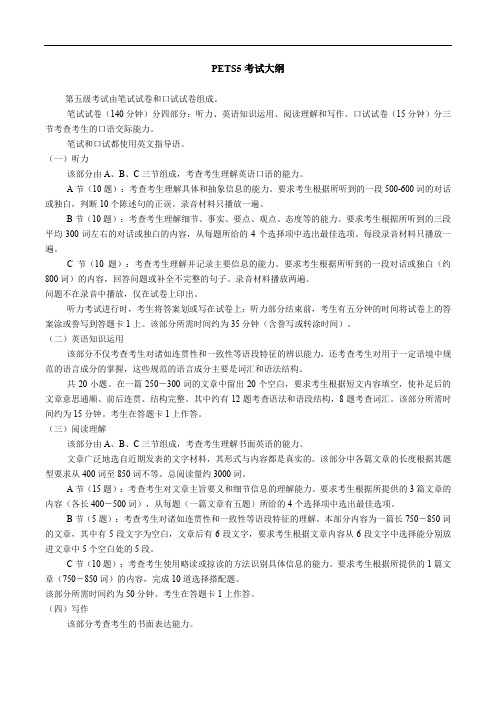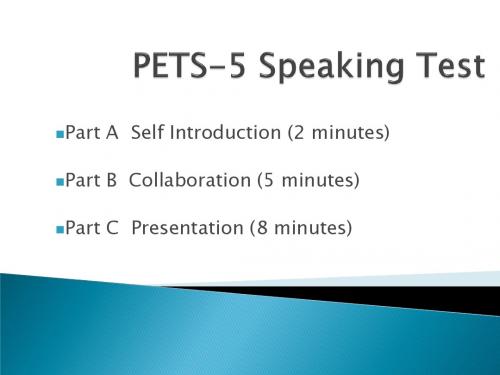PETS5考试大纲(完整资料).doc
PETS5考试大纲.doc

PETS5考试大纲第五级考试由笔试试卷和口试试卷组成。
笔试试卷(140分钟)分四部分:听力、英语知识运用、阅读理解和写作。
口试试卷(15分钟)分三节考查考生的口语交际能力。
笔试和口试都使用英文指导语。
(一)听力该部分由A、B、C三节组成,考查考生理解英语口语的能力。
A节(10题):考查考生理解具体和抽象信息的能力。
要求考生根据所听到的一段500-600词的对话或独白,判断10个陈述句的正误。
录音材料只播放一遍。
B节(10题):考查考生理解细节、事实、要点、观点、态度等的能力。
要求考生根据所听到的三段平均300词左右的对话或独白的内容,从每题所给的4个选择项中选出最佳选项。
每段录音材料只播放一遍。
C节(10题):考查考生理解并记录主要信息的能力。
要求考生根据所听到的一段对话或独白(约800词)的内容,回答问题或补全不完整的句子。
录音材料播放两遍。
问题不在录音中播放,仅在试卷上印出。
听力考试进行时,考生将答案划或写在试卷上;听力部分结束前,考生有五分钟的时间将试卷上的答案涂或誊写到答题卡1上。
该部分所需时间约为35分钟(含誊写或转涂时间)。
(二)英语知识运用该部分不仅考查考生对诸如连贯性和一致性等语段特征的辨识能力,还考查考生对用于一定语境中规范的语言成分的掌握,这些规范的语言成分主要是词汇和语法结构。
共20小题。
在一篇250-300词的文章中留出20个空白,要求考生根据短文内容填空,使补足后的文章意思通顺、前后连贯、结构完整。
其中约有12题考查语法和语段结构,8题考查词汇。
该部分所需时间约为15分钟。
考生在答题卡1上作答。
(三)阅读理解该部分由A、B、C三节组成,考查考生理解书面英语的能力。
文章广泛地选自近期发表的文字材料,其形式与内容都是真实的。
该部分中各篇文章的长度根据其题型要求从400词至850词不等。
总阅读量约3000词。
A节(15题):考查考生对文章主旨要义和细节信息的理解能力。
要求考生根据所提供的3篇文章的内容(各长400-500词),从每题(一篇文章有五题)所给的4个选择项中选出最佳选项。
挑战PETS全攻略:全国英语等级考试教程5(附光盘)

挑战PETS全攻略:全国英语等级考试教程5(附光盘)
目录
第一部分备考须知
全国英语等级考试(PETS)体系简介
PETS第五级考试级别标准
PETS第五级考试的形式、内容与结构
第二部分笔试教程
第一章听力
考试大纲详解
听力试题点评及命题分析指导
同步强化练习
练习答案
听力原文
第二章英语知识运用
考试大纲详解
听力试题点评及命题分析指导
同步强化练习
练习答案
听力原文
第三章阅读理解
考试大纲详解
听力试题点评及命题分析指导
同步强化练习
练习答案
听力原文
第四章写作
考试大纲详解
听力试题点评及命题分析指导
同步强化练习
练习答案
听力原文
第三部分口试教程
考试大纲详解
口试试题点评及命题分析指导
同步强化练习
口试练习问答提示
第四部分笔试模拟预测试卷
笔试模拟预测试卷
笔试模拟预测试卷参考答案及详解
第五部分口试模拟预测考场
口试模拟预测考场
口试模拟预测考场问答参考提示
第六部分附录
功能意念表示范词缀表
词汇表。
PETS_5_口语考试说明

PART C TESTING SKILLS / FUNCTION
Structuring and timing a talk Using opening remarks Extending a talk Using transition phrases Giving reasons Giving more details Concluding a talk Asking questions
PART B TESTING SKILLS / FUNCTION
Clarifying statements Expressing opinions, attitudes and values Defending arguments Giving reasons, facts, examples Using logical and reasoning statements Comparing objects, people and events
PETS-5 SPEAKING TEST
Part A Self Introduction (2 minutes)
Part B Collaboration (5 minutes)
Part C Presentation (8 minutes)
PART A SELF-INTRODUCTION (2MS)
PART A TESTING SKILLS / FUNCTION
7. Expressing likes and dislikes (eg. job) 8. Expressing preferences (eg. Plane or train) 9. Explaining changes (eg. hometown) 10. Expressing your opinions (eg. Internet games) 11. Explaining the reasons (briefly) 12. Speculating and anticipating events (eg. Study abroad)
PETS_5_口语考试说明

2 Examiners: Examiner One talks with candidates, Examiner Two gives the score.
2 Candidates: Candidate A and B give their self-introduction respectively at the request of the Examiner.
Part Part Part
A Self Introduction (2 minutes) B Collaboration (5 minutes)
C Presentation (8 minutes)
Name Work/study Hometown dream involve National holiday Mid-autumn fesabout your family? Could you tell us something about it?
There are four people in my family. We get along very well. My father and mother work in the same factory. And my brother is an engineer.
Technology, computer, Internet, globalization,
Fashion,, sports, entertainment
Mass media, culture…
Clarifying statements
Expressing opinions, attitudes and values
PETS5历年真题(口语)(完整资料).doc

【最新整理,下载后即可编辑】2011年12月:口试一(PP l-5 for Interlocutor)Part A: Self-introduction (2 minutes)Interlocutor:Good morning (afternoon/evening). Could I have your mark sheets, please? Thank you.(Hand over the mark sheets to the Assessor.)My name is... and this is my colleague...He/she is not going to ask you any questions, but he/she is just going to be listening to us.So, your name is... and... ? Thank you.First of all, we’d like to know something about you, so I’m going to ask you some questions about yourselves. (Begin with Candidate A, then move on to Candidate B)Now (say the name of the candidate and ask the questions). Hometown●Where are you from?●How long did you live there?●What’s it like living there?●How does your hometown compare with (place where thecandidate is currently living)?Family●What about your family?●Could you tell us something about it?Work/ Study●What do you do in (the candidate’s hometo wn), do you work orstudy? (If the candidate has already started work:)●What does your work involve?●Is your job something you always wanted to do?●How long do you think you will stay in this job?(If the candidate is still at school, college or university:)●What are your favourite subjects at school? What exactly are youstudying?●What type of Work are you hoping to do in the future?●What qualifications will you need to do that?(For Interlocutor)Part B: Collaboration (5 minutes)Topic: Reasons for the popularity of online gamesNow, (say the names of Candidate A and Candidate B), here is a list of reasons for the popularity of online games.(Hand out the list to the candidates and let them read it through.)Why are online games so popular?Choose three from the list and tell each other why. If you hold different opinions you may argue and you may also add your own ideas that are not listed here. You just talk to each other and I won’t join you. You have 5 minutes.All right. Would you begin?(The interlocutor may sit back and intervene only when necessary.)Reasons for the popularity of online games●To kill time●To make more friends●To experience a different life style●To earn pocket money●To relieve oneself of stress●To entertain oneself●To escape from reality(For Interlocutor)(For Interlocutor)Part C: Presentation (8 minutes) Topic Card(For Interlocutor)Only for 3-candidate FormatPart C: PresentationTopic Card(PP 6-8 for Assessor)Part B: Collaboration (5 minutes)Topic: Reasons for the popularity of online gamesNow, (say the names of Candidate A and Candidate B), here is a list of reasons for the popularity of online game. (Hand out the list to the candidates and let them read it through.) Why are online games so popular?Choose three from the list and tell each other why. If you hold different opinions you may argue and you may also add your own ideas that are not listed here. You just talk to each other and I won’t join you. You have 5 minutes.All right. Would you begin?(The interlocutor may sit back and intervene only when necessary.)Reasons for the popularity of online games●To kill time●To make more friends●To experience a different life style●To earn pocket money●To relieve oneself of stress●To entertain oneself●To escape from reality(For Assessor)Part C: Presentation (8 minutes)Topic Card(For Assessor)Only for 3-candidate FormatPart C: PresentationTopic CardPart B: Collaboration (5 minutes)Topic: Reasons for the popularity of online gamesThe following is a list of reasons for the popularity of online games. Why are online games so popular?Choose three from the list and tell each other why. If you holddifferent opinions you may argue and you may also add your own ideas that are not listed here.Reasons for the popularity of online games●To kill time●To make more friends●To experience a different life style●To earn pocket money●To relieve oneself of stress●To entertain oneself●To escape from reality(For Candidate)Part C: PresentationTopic Card(For Candidate)Part C: PresentationTopic Card(For Candidate)Only for 3-candidate Format Part C: PresentationTopic Card2011年12月:口试二(PP 1—5 for Interlocutor)Part A: Self-introduction (2 minutes)Interlocutor:Good morning (afternoon/evening). Could I have your mark sheets, please? Thank you.(Hand over the mark sheets to the Assessor.)My name is... and this is my colleague...He/she is not going to ask you any questions, but he/she is just going to be listening to us.So, your name is ... and... ? Thank you.First of all, we’d like to know something about you, so I’m going to ask you some questions about yourselves.(Begin with Candidate A, then move on to Candidate B)Now (say the name of the candidate and ask the questions). Hometown●Where are you from?●How long did you live there?●What’s it like living there?●How does your hometown compare with (place where thecandidate is currently living)?Family●What about your family?●Could you tell us something about it?Work/Study●What do you do in (the candidate’s hometown), do you work orstudy?(If the candidate has already started work:)●What does your work involve?●Is your job something you always wanted to do?●How long do you think you will stay in this job?(If the candidate is still at school, college or university:)●What are your favourite subjects at school? What exactly are youstudying?●What type of work are you hoping to do in the future?●What qualifications will you need to do that?(For Interlocutor)Part B: Collaboration (5 minutes)Topic: Students in Financial DifficultiesNow, (say the names of Candidate A and Candidate B), here is a list of measures to help students in financial difficulties. (Hand out the list to the candidates and let them read it through.) What do you think we can do to help the university students in financial difficulties to complete their studies?Choose three from the list and tell each other why. If you hold different opinions you may argue and you may also add your own ideas that are not listed here. You just talk to each other and I won’t join you. You have 5 minutes.All right. Would you begin?(The interlocutor may sit back and intervene only when necessary.)Measures to help students in financial difficulties:●Provide tuition-free education●Grant subsidies●Provide interest-free loans●Offer special scholarships●Allow suspension of schooling●Create part-time jobs on campus●Permit extension of the period of study(For Interlocutor)(For Interlocutor)Part C: Presentation (8 minutes) Topic Card(For Interlocutor)Only for 3-candidate FormatPart C: PresentationTopic Card(PP 6-8 for Assessor)Part B: Collaboration (5 minutes)Topic: Students in Financial DifficultiesNow, (say the names of Candidate A and Candidate B), here is a list of measures to help students in financial difficulties. (Hand out the list to the candidates and let them read it through.) What do you think we can do to help the university students in financial difficulties to complete their studies?Choose three from the list and tell each other why. If you hold different opinions you may argue and you may also add your own ideas that are not listed here. You just talk to each other and I won’t join you. You have 5 minutes.All right. Would you begin?(The interlocutor may sit back and intervene only when necessary.)Measures to help students in financial difficulties:●Provide tuition-free education●Grant subsidies●Provide interest-free loans●Offer special scholarships●Allow suspension of schooling●Create part-time jobs on campus●Permit extension of the period of study(For Assessor)Part C: Presentation (8 minutes)Topic CardA(For Assessor)Only for 3-candidate FormatPart C: PresentationTopic Card(PP 9-12 for Candidate)Part B: Collaboration (5 minutes)Topic: Students in Financial DifficultiesThe following is a list of measures to help students in financial difficulties. What do you think we can do to help the university students in financial difficulties to complete their studies?Choose three from the list and tell each other why. If you hold different opinions you may argue and you may also add your own ideas that are not listed here.Measures to help students in financial difficulties:Provide tuition-free education●Grant subsidies●Provide interest-free loans●Offer special scholarships●Allow suspension of schooling●Create part-time jobs on campus●Permit extension of the period of study Part C: PresentationTopic Card(For Candidate)Part C: PresentationTopic Card(For Candidate)Only for 3-candidate FormatPart C: PresentationTopic Card2012年6月:口试一(PP 1—5 for Interlocutor)Part A: Self-introduction (2 minutes)Interlocutor:Good morning (afternoon/evening). Could I have your mark sheets, please? Thank you.(Hand over the mark sheets to the Assessor.)My name is... and this is my colleague...He/she is not going to ask you any questions, but he/she is just going to be listening to us.So, your name is ... and... ? Thank you.First of all, we’d like to know something about you, so I’m going to ask you some questions about yourselves.(Begin with Candidate A, then move on to Candidate B)Now (say the name of the candidate and ask the questions). Hometown●Where are you from?●How long did you live there?●What’s it like living there?●How does your hometown compare with (place where thecandidate is currently living)?Family●What about your family?●Could you tell us something about it?Work/Study●What do you do in (the candidate’s hometown), do you work orstudy?(If the candidate has already started work:)●What does your work involve?●Is your job something you always wanted to do?●How long do you think you will stay in this job?(If the candidate is still at school, college or university:)●What are your favourite subjects at school? What exactly are youstudying?●What type of work are you hoping to do in the future?●What qualifications will you need to do that?(For Interlocutor)Part B: Collaboration (5 minutes)Topic: Working extra hoursNow, (say the names of Candidate A and Candidate B), here is a list of the main reasons for working extra hours. (Hand out the list to the candidates and let them read it through.) What do you think are the main reasons for working extra hours?Choose three from the list and tell each other why. If you hold different opinions you may argue and you may also add your own ideas that are not listed here. You just talk to each other and I won’t join you. You have 5 minutes.All right. Would you begin?(The interlocutor may sit back and intervene only when necessary.)Reasons for working extra hours:● a consequence of low working efficiency● a deliberate effort to push career up● a failure to turn down your boss’s request●an act of following your colleagues● a way to secure your job especially in crises● a requirement of certain professions● a result of mismanagement of time(For Interlocutor)(For Interlocutor)Part C: Presentation (8 minutes) Topic Card(For Interlocutor)Only for 3-candidate FormatPart C: PresentationTopic Card(PP 6-8 for Assessor)Part B: Collaboration (5 minutes)Topic: Working extra hoursNow, (say the names of Candidate A and Candidate B), here is a list of the main reasons for working extra hours. (Hand out the list to the candidates and let them read it through.) What do you think are the main reasons for working extra hours?Choose three from the list and tell each other why. If you hold different opinions you may argue and you may also add your own ideas that are not listed here. You just talk to each other and I won’t join you. You have 5 minutes.All right. Would you begin?(The interlocutor may sit back and intervene only when necessary.)Reasons for working extra hours:● a consequence of low working efficiency● a deliberate effort to push career up● a failure to turn down your boss’s request●an act of following your colleagues● a way to secure your job especially in crises● a requirement of certain professions● a result of mismanagement of time(For Assessor)Part C: Presentation (8 minutes)Topic Card(For Assessor)Only for 3-candidate FormatPart C: PresentationTopic Card(PP 9-12 for Candidate)Part B: Collaboration (5 minutes)Topic: Working extra hoursWhat do you think are the main reasons for working extra hours? Choose three from the list and tell each other why. If you hold different opinions you may argue and you may also add your own ideas that are not listed here.Reasons for working extra hours:● a consequence of low working efficiency● a deliberate effort to push career up● a failure to turn down your boss’s request●an act of following your colleagues● a way to secure your job especially in crises● a requirement of certain professions● a result of mismanagement of time(For Candidate)Part C: PresentationTopic Card(For Candidate)Part C: PresentationTopic Card(For Candidate)Only for 3-candidate Format Part C: PresentationTopic Card2012年6月:口试二(PP 1—5 for Interlocutor)Part A: Self-introduction (2 minutes)Interlocutor:Good morning (afternoon/evening). Could I have your mark sheets, please? Thank you.(Hand over the mark sheets to the Assessor.)My name is... and this is my colleague...He/she is not going to ask you any questions, but he/she is just going to be listening to us.So, your name is ... and... ? Thank you.First of all, we’d like to know something about you, so I’m going to ask you some questions about yourselves.(Begin with Candidate A, then move on to Candidate B)Now (say the name of the candidate and ask the questions). Hometown●Where are you from?●How long did you live there?●What’s it like living there?●How does your hometown compare with (place where thecandidate is currently living)?Family●What about your family?●Could you tell us something about it?Work/Study●What do you do in (the candidate’s hometown), do you work orstudy?(If the candidate has already started work:)●What does your work involve?●Is your job something you always wanted to do?●How long do you think you will stay in this job?(If the candidate is still at school, college or university:)●What are your favourite subjects at school? What exactly are youstudying?●What type of work are you hoping to do in the future?●What qualifications will you need to do that?(For Interlocutor)Part B: Collaboration (5 minutes)Topic: Disadvantages of job-hoppingNowadays people tend to change their jobs frequently. (Say the names of Candidate A and Candidate B) Here is a list of disadvantages of job-hopping. (Hand out the list to the candidates and let them read it through.) What do you think of job-hopping?Choose three from the list and tell each other why. If you hold different opinions you may argue and you may also add your own ideas that are not listed here. You just talk to each other and I won’t join you. You have 5 minutes.All right. Would you begin?(The interlocutor may sit back and intervene only when necessary.)Disadvantages of job-hopping:●Unhelpful to one’s career advancement●Possible suspicion of loyalty by employers●Interruption of experience building●Challenges at the new job●Potential difficulties in colleague relationship● A break from the previous business network(For Interlocutor)(For Interlocutor)Part C: Presentation (8 minutes) Topic Card(For Interlocutor)Only for 3-candidate FormatPart C: PresentationTopic Card(PP 6-8 for Assessor)Part B: Collaboration (5 minutes)Topic: Disadvantages of job-hoppingNowadays people tend to change their jobs frequently. (Say the names of Candidate A and Candidate B) Here is a list of disadvantages of job-hopping. (Hand out the list to the candidates and let them read it through.) What do you think of job-hopping?Choose three from the list and tell each other why. If you hold different opinions you may argue and you may also add your own ideas that are not listed here. You just talk to each other and I won’t join you. You have 5 minutes.All right. Would you begin? (The interlocutor may sit back and intervene only when necessary.)Disadvantages of job-hopping:●Unhelpful to one’s career advancement●Possible suspicion of loyalty by employers●Interruption of experience building●Challenges at the new job●Potential difficulties in colleague relationship● A break from the previous business network(For Assessor)Part C: Presentation (8 minutes)Topic Card(For Assessor)Only for 3-candidate FormatPart C: PresentationTopic Card(PP 9-12 for Candidate)Part B: Collaboration (5 minutes)Topic: Disadvantages of job-hopping (The practice of changing jobs frequently)What do you think of job-hopping? Choose three from the list and tell each other why. If you hold different opinions you may argue and you may also add your own ideas that are not listed here. Disadvantages of job-hopping:●Unhelpful to one’s career advancement●Possible suspicion of loyalty by employers●Interruption of experience building●Challenges at the new job●Potential difficulties in colleague relationship ● A break from the previous business network (For Candidate)Part C: PresentationTopic Card(For Candidate)Part C: PresentationTopic Card(For Candidate)Only for 3-candidate FormatPart C: PresentationTopic Card2013年6月:口试一(PP 1—5 for Interlocutor)Part A: Self-introduction (2 minutes)Interlocutor:Good morning (afternoon/evening). Could I have your mark sheets, please? Thank you.(Hand over the mark sheets to the Assessor.)My name is... and this is my colleague...He/she is not going to ask you any questions, but he/she is just going to be listening to us.So, your name is ... and... ? Thank you.First of all, we’d like to know something about you, so I’m going to ask you some questions about yourselves.(Begin with Candidate A, then move on to Candidate B)Now (say the name of the candidate and ask the questions). Hometown●Where are you from?●How long did you live there?●What’s it like living there?●How does your hometown compare with (place where thecandidate is currently living)?Family●What about your family?●Could you tell us something about it?Work/Study●What do you do in (the candidate’s hometown), do you work orstudy?(If the candidate has already started work:)●What does your work involve?●Is your job something you always wanted to do?●How long do you think you will stay in this job?(If the candidate is still at school, college or university:)●What are your favourite subjects at school? What exactly are youstudying?●What type of work are you hoping to do in the future?●What qualifications will you need to do that?(For Interlocutor)Part B: Collaboration (5 minutes)Topic: Advantages and disadvantages of wearing school uniforms Now, (say the names of Candidate A and Candidate B), here is a list of advantages and disadvantages for students to wear school uniforms. (Hand out the list to the candidates and let them read it through.) What do you think are the main advantages or disadvantages for students to wear school uniforms?Choose three from the list and tell each other why. If you hold different opinions you may argue and you may also add your own ideas that are not listed here. You just talk to each other and I won’t join you. You have 5 minutes.All right. Would you begin?(The interlocutor may sit back and(For Interlocutor)(For Interlocutor)Part C: Presentation (8 minutes) Topic Card(For Interlocutor)Only for 3-candidate FormatPart C: PresentationTopic Card(PP 6-8 for Assessor)Part B: Collaboration (5 minutes)Topic: Advantages and disadvantages of wearing school uniforms Now, (say the names of Candidate A and Candidate B), here is a list of advantages and disadvantages for students to wear school uniforms. (Hand out the list to the candidates and let them read it through.) What do you think are the main advantages or disadvantages for students to wear school uniforms?Choose three from the list and tell each other why. If you hold different opinions you may argue and you may also add your own ideas that are not listed here. You just talk to each other and I won’t join you. You have 5 minutes.All right. Would you begin?(The interlocutor may sit back and(For Assessor)Part C: Presentation (8 minutes)Topic Card(For Assessor)Only for 3-candidate FormatPart C: PresentationTopic Card(PP 9-12 for Candidate)Part B: Collaboration (5 minutes)Topic: Advantages and disadvantages of wearing school uniforms What do you think are the main advantages or disadvantages for students to wear school uniforms? Choose three from the list and telleach other why. If you hold different opinions you may argue and you(For Candidate)Part C: PresentationTopic Card(For Candidate)Part C: PresentationTopic Card(For Candidate)Only for 3-candidate FormatPart C: Presentation Topic Card2013年6月:口试二(PP 1—5 for Interlocutor)Part A: Self-introduction (2 minutes)Interlocutor:Good morning (afternoon/evening). Could I have your mark sheets, please? Thank you.(Hand over the mark sheets to the Assessor.)My name is... and this is my colleague...He/she is not going to ask you any questions, but he/she is just going to be listening to us.So, your name is ... and... ? Thank you.First of all, we’d like to know something about you, so I’m going to ask you some questions about yourselves.(Begin with Candidate A, then move on to Candidate B)Now (say the name of the candidate and ask the questions). Hometown●Where are you from?●How long did you live there?●What’s it like living there?●How does your hometown compare with (place where thecandidate is currently living)?Family●What about your family?●Could you tell us something about it?Work/Study●What do you do in (the candidate’s hometown), do you work orstudy?(If the candidate has already started work:)●What does your work involve?●Is your job something you always wanted to do?●How long do you think you will stay in this job?(If the candidate is still at school, college or university:)●What are your favourite subjects at school? What exactly are youstudying?●What type of work are you hoping to do in the future?●What qualifications will you need to do that?(For Interlocutor)Part B: Collaboration (5 minutes)Topic: Preparations one should make before studying abroad Now, (say the names of Candidate A and Candidate B), here is a list of preparations one should make before studying abroad. (Hand out the list to the candidates and let them read it through.) What preparations do you think one should make before studying abroad?Choose three from the list and tell each other why. If you hold different opinions you may argue and you may also add your own ideas that are not listed here. You just talk to each other and I won’t join you. You have 5 minutes.All right. Would you begin?(The interlocutor may sit back and intervene only when necessary.)Preparations one should make before studying abroad●Learning the language of the destination country●Learning about the culture of the destination country●Learning about the climate in the destination country●Learning to manage personal finances●Learning to use household appliances●Learning to cook(For Interlocutor)(For Interlocutor)Part C: Presentation (8 minutes) Topic Card(For Interlocutor)Only for 3-candidate FormatPart C: PresentationTopic Card(PP 6-8 for Assessor)Part B: Collaboration (5 minutes)Topic: Preparations one should make before studying abroad Now, (say the names of Candidate A and Candidate B), here is a list of preparations one should make before studying abroad. (Hand out the list to the candidates and let them read it through.) What preparations do you think one should make before studying abroad?Choose three from the list and tell each other why. If you hold different opinions you may argue and you may also add your own ideas that are not listed here. You just talk to each other and I won’t join you. You have 5 minutes.All right. Would you begin?(The interlocutor may sit back and intervene only when necessary.)Preparations one should make before studying abroad●Learning the language of the destination country●Learning about the culture of the destination country●Learning about the climate in the destination country●Learning to manage personal finances●Learning to use household appliances●Learning to cook(For Assessor)Part C: Presentation (8 minutes)Topic Card(For Assessor)Only for 3-candidate FormatPart C: PresentationTopic Card(PP 9-12 for Candidate)Part B: Collaboration (5 minutes)Topic: Preparations one should make before studying abroadWhat preparations do you think one should make before studying abroad? Choose three from the list and tell each other why. If you hold different opinions you may argue and you may also add your own ideas that are not listed here.Preparations one should make before studying abroad●Learning the language of the destination country●Learning about the culture of the destination country●Learning about the climate in the destination country●Learning to manage personal finances●Learning to use household appliances●Learning to cook(For Candidate)Part C: PresentationTopic Card(For Candidate)Part C: PresentationTopic Card(For Candidate)Only for 3-candidate FormatPart C: PresentationTopic Card2013年12月口试一(PP l-5 for Interlocutor)Part A: Self-introduction (2 minutes)Interlocutor:Good morning (afternoon/evening). Could I have your mark sheets, please? Thank you.(Hand over the mark sheets to the Assessor.)My name is... and this is my colleague...He/she is not going to ask you any questions, but he/she is just going to be listening to us.So, your name is... and...? Thank you.First of all, we’d like to know something a bout you, so I’m going to ask you some questions about yourselves.(Begin with Candidate A, then move on to Candidate B) Now (say the name of the candidate and ask the questions).Hometown●Where are you from?●How long did you live there?●What’s it like liv ing there?●How does your hometown compare with (place where thecandidate is currently living)?Family●What about your family?●Could you tell us something about it?Work/ Study●What do you do in (the candidate’s hometown), do you work orstudy?(If the candidate has already started work:)●What does your work involve?●Is your job something you always wanted to do?●How long do you think you will stay in this job?(If the candidate is still at school, college or university:)●What are your favourite subjects at school? What exactly are youstudying?。
pets5备考资料

教材:
全国英语等级考试标准教程学习指导第五级-高等教育出版社
全国英语等级考试(PETS)笔试题型全解与高分突破第五级
全国英语等级考试教材2006最新版-第五级-教材配套录音MP3
[公共英语全国英语等级考试-教材-第五级-2006版新大纲-外文出版社公共英语等级考试五级教程MP3下载
《全国英语等级考试五级教程》下载
口语
2014年考试专用全国等级考试口试必备第五级
[大家网]全国英语等级考试五级口语小伴侣
2010年最新PETS五级口语预测
模拟题、真题
2013年版全国英语等级考试全真模拟试卷第五级(六套模拟题+两套预测试卷+一套真..
阅读:
PETS公共英语五级阅读英语100篇精读荟萃(高级篇)
词汇:
PETS-5词汇共一百多页下载
最新PETS考试词汇详解(五级)_大连理工大学出版社_2003_吴琼主编.PDF下载
PETS5 通关讲课视频:共12讲,下载~!。
PETS五级考试简介及大纲要求

PETS五级考试简介及大纲要求PETS第五级考试由笔试试卷和口试试卷组成。
笔试试卷(140分钟)分四部分:听力、英语知识运用、阅读理解和写作。
口试试卷(15分钟)分三节考查考生的口语交际能力。
该部分由A、B、C三节组成,考查考生理解英语口语的能力。
A节(10题):考查考生理解具体和抽象信息的能力。
要求考生根据所听到的一段500-600词的对话或独白,判断10个陈述句的正误。
录音材料只播放一遍。
B节(10题):考查考生理解细节、事实、要点、观点、态度等的能力。
要求考生根据所听到的三段平均300词左右的对话或独白的内容,从每题所给的4个选择项中选出选项。
每段录音材料只播放一遍。
C节(10题):考查考生理解并记录主要信息的能力。
要求考生根据所听到的一段对话或独白(约800词)的内容,回答问题或补全不完整的句子。
录音材料播放两遍。
问题不在录音中播放,仅在试卷上印出。
听力考试进行时,考生将答案划或写在试卷上;听力部分结束前,考生有五分钟的时间将试卷上的答案涂或誊写到答题卡1上。
该部分所需时间约为35分钟(含誊写或转涂时间)。
(二)英语知识运用该部分不仅考查考生对诸如连贯性和一致性等语段特征的辨识能力,还考查考生对用于一定语境中规范的语言成分的掌握,这些规范的语言成分主要是词汇和语法结构。
共20小题。
在一篇250-300词的文章中留出20个空白,要求考生根据短文内容填空,使补足后的文章意思通顺、前后连贯、结构完整。
其中约有12题考查语法和语段结构,8题考查词汇。
该部分所需时间约为15分钟。
考生在答题卡1上作答。
(三)阅读理解该部分由A、B、C三节组成,考查考生理解书面英语的能力。
文章广泛地选自近期发表的文字材料,其形式与内容都是真实的。
该部分中各篇文章的长度根据其题型要求从400词至850词不等。
总阅读量约3000词。
A节(15题):考查考生对文章主旨要义和细节信息的理解能力。
要求考生根据所提供的3篇文章的内容(各长400-500词),从每题(一篇文章有五题)所给的4个选择项中选出选项。
pets5考试内容

pets5考试内容
pets5考试内容包括听力、阅读、写作和口语四个部分。
其中听力部分包括听力理解和听力填空,考察学生对不同语速、语调和口音的英语进行理解的能力;阅读部分包括阅读理解和选词填空,考察学生对不同主题和难度的英文文章进行理解和推理的能力;写作部分包括两个写作任务,要求学生对给定的主题进行短文写作和邮件写作;口语部分包括口语复述、口语阅读和口语交际三个部分,要求学生具备流利的口语表达和交流能力。
pets5考试内容难度逐步提高,考生需要认真备考和积累英语知识和能力。
- 1 -。
- 1、下载文档前请自行甄别文档内容的完整性,平台不提供额外的编辑、内容补充、找答案等附加服务。
- 2、"仅部分预览"的文档,不可在线预览部分如存在完整性等问题,可反馈申请退款(可完整预览的文档不适用该条件!)。
- 3、如文档侵犯您的权益,请联系客服反馈,我们会尽快为您处理(人工客服工作时间:9:00-18:30)。
【最新整理,下载后即可编辑】
PETS5考试大纲
第五级考试由笔试试卷和口试试卷组成。
笔试试卷(140分钟)分四部分:听力、英语知识运用、阅读理解和写作。
口试试卷(15分钟)分三节考查考生的口语交际能力。
笔试和口试都使用英文指导语。
(一)听力
该部分由A、B、C三节组成,考查考生理解英语口语的能力。
A节(10题):考查考生理解具体和抽象信息的能力。
要求考生根据所听到的一段500-600词的对话或独白,判断10个陈述句的正误。
录音材料只播放一遍。
B节(10题):考查考生理解细节、事实、要点、观点、态度等的能力。
要求考生根据所听到的三段平均300词左右的对话或独白的内容,从每题所给的4个选择项中选出最佳选项。
每段录音材料只播放一遍。
C节(10题):考查考生理解并记录主要信息的能力。
要求考生根据所听到的一段对话或独白(约800词)的内容,回答问题或补全不完整的句子。
录音材料播放两遍。
问题不在录音中播放,仅在试卷上印出。
听力考试进行时,考生将答案划或写在试卷上;听力部分结束前,考生有五分钟的时间将试卷上的答案涂或誊写到答题卡1上。
该部分所需时间约为35分钟(含誊写或转涂时间)。
(二)英语知识运用
该部分不仅考查考生对诸如连贯性和一致性等语段特征的辨识能力,还考查考生对用于一定语境中规范的语言成分的掌握,这些规范的语言成分主要是词汇和语法结构。
共20小题。
在一篇250-300词的文章中留出20个空白,要求考生根据短文内容填空,使补足后的文章意思通顺、前后连贯、结构完整。
其中约有12题考查语法和语段结构,8题考查词汇。
该部分所需时间约为15分钟。
考生在答题卡1上作答。
(三)阅读理解
该部分由A、B、C三节组成,考查考生理解书面英语的能力。
文章广泛地选自近期发表的文字材料,其形式与内容都是真实的。
该部分中各篇文章的长度根据其题型要求从400词至850词不等。
总阅读量约3000词。
A节(15题):考查考生对文章主旨要义和细节信息的理解能力。
要求考生根据所提供的3篇文章的内容(各长400-500词),从每题(一篇文章有五题)所给的4个选择项中选出最佳选项。
B节(5题):考查考生对诸如连贯性和一致性等语段特征的理解。
本部分内容为一篇长750-850词的文章,其中有5段文字为空白,文章后有6段文字,要求考生根据文章内容从6段文字中选择能分别放进文章中5个空白处的5段。
C节(10题):考查考生使用略读或掠读的方法识别具体信息的能力。
要求考生根据所提供的1篇文章(750-850词)的内容,完成10道选择搭配题。
该部分所需时间约为50分钟。
考生在答题卡1上作答。
(四)写作
该部分考查考生的书面表达能力。
要求考生根据主题性或情景性的提示或问题写一篇约250词的短文。
该部分所需时间约为40分钟。
考生在答题卡2上作答。
(五)口试
口试分A、B、C三节,测试考生英语口语的交际能力。
每次口试采取两名口试教师和两名考生的形式。
一名口试教师不参与交谈,专事评分;另一名主持口试,随时与考生交谈并评分。
专事评分的教师所给分数的权重占考生口试成绩的三分之二,主持口试的教师所给分数的权重占考生口试成绩的三分之一。
A节:考查考生理解一般性问题并能恰当地回答这些问题的能力。
考官问一些有关考生生活、工作、学习等自我介绍方面的问题。
该节约需2分钟时间。
B节:考查考生用英语进行讨论的能力。
该节的形式有解决问题、排序、角色扮演、讨论、决策、或就两个完全相反的观点阐述自己的观点等。
该节约需5分钟时间。
C节:考查考生连续表达的能力。
考生分别从所给的三个话题中选择一个话题进行连续表达,并就此话题互相提问、回答。
该节约需8分钟时间。
(六)笔试结构表
(七)口试结构表
听力:第五级为长对话或段落理解,题型为判断正误(true or false)和回答问题,原WSK题型有单句理解、小对话理解和长对话或段落理解,全部为四选一客观题。
词汇:PETS第五级考生应掌握7500左右的词汇以及相关词组,与原WSK(EPT)的词汇量要求完全一致。
阅读:PETS第五级阅读理解分三部分:多项选择、语段顺序理解和选择配伍。
语段顺序理解即在一篇长度为750~850词的文章章中留有5处空白,文后有六段文字,要求考生根据文章内容从六段文字中选择五段分别放进文章的五个空白处。
此部分考查考生对诸如连贯性和一致性等语段特征的理解。
选择配伍题型要求考生根据所提供的一篇较长文章的内容,完成10道选择搭配题。
本题型旨在考查考生从长文章中快速查找所需信息的能力。
语段顺序理解和选择配伍是WSK未曾有过的新题型。
写作:PETS第五级要求考生根据主题性或情景性提示写出一篇不少于250词的短文,类型除了一般性文章外还包括书信、科研论文、实验报告、申请材料等;而WSK是指导性作文(guided writing),要求按命题写出一篇不少于150个词的文章。
通过对比可以看出,PETS第五级比WSK写作要求高、难度大。
需要注意的问题
1.听力理解是考查考生以语音形式接受信息的能力。
PETS考试各级都将听力列于非常重要的位置,并强调其功能性和交际性。
需要告知考生的是,与现行各类英语听力考试不同:
(1)PETS听力的提问方式是以文字形式在卷面上给出,不在录音中播放;
(2)有的录音内容播放两遍;
(3)答题时间分为听前阅读问题和听后回答问题两部分,并且在全部录音播放结束后再给五分钟的涂卡时间。
2.第三、四、五级没有专门测试语法的单项,而是在英语知识运用部分中通过综合填空来考查考生对语法知识的应用情况。
3.PETS各级都没有专门测试词汇的单项,而现行各类英语统考都有词汇题:要么通过选择填空、要么通过词汇替换来专测词汇。
PETS主要通过完型填空这一题型在语篇基础上考查对语法词汇的掌握和综合运用能力。
PETS第1~4级的完型填空部分除篇幅长短不同外,均为四选一客观题,而第五级完型填空中的空缺词下没有选择项,要求考生根据短文内容补全原文,使之意思通顺、前后连贯、结构完整,且要有正确的拼写。
这比原WSK的同类题型难度大多了。
4.口试是新增加的测试形式,突出了听说技能的考查。
截止PETS 推出之日,中考、高考、大英四级、六级、考研、WSK均没有口语考试。
PETS各级口试主要包括:
(1)个人情况介绍,由考官就个人的家庭、职业、兴趣爱好等问题提问;
(2)考生按所给的信息卡互相提问(第一、二级)或讨论、分析评论问题(第三、四、五级);
(3)考生就信息卡上的图片或题目进行描述(第三级)、连续性表达并论证个人观点(第四、五级)。
各级口试的时间分别为8、10、10、12、15分钟。
1.Listen to yourself(听自己)。
如果你不能听出你自己的发音问题,就很难去改正它。
试着把你的朗读或演说录下来,并与以英语为母语的外国人士做个比较。
2.Slow down(慢下来) 很多英语学习者说话都求快,其实快不见得就说得好,说得越快毛病越不容易改掉。
每天练习一点点,从声调到单词再到句子,慢慢来,急不得。
3.Picture it(画图) 闭上眼睛,在说话之前想想如何发这个音,想想嘴巴和脸的定位。
4.Copy the experts(模仿专家) 英语为母语的人士是最好的老师。
所以,注意听英语广播或英语电影、电视节目,听他们的发音,还要注意看他们的口形。
不要看字幕,模仿你听到的声音,即使你不确定他们在说什么。
5.Practice(练习) 发音有问题是难免的,因此很多人会害怕说错而不开口。
没关系,多练习就好了,不要害羞。
6.Find a partner(找伙伴) 从别人那里得到反馈是很重要的。
找个也对提高英语水平感兴趣的伙伴,互相鼓励,互相比赛,多对话。
7.Be poetic(充满诗意) 大声地念诗、演讲,专注在字的重音和音调。
因为,诗歌通常都是琅琅上口,有节奏感的,多多练习有助于提高英语水平。
发音准了,语调对了,语感慢慢出来了,这对记忆单词和交流都有好处。
8.Sing a song(唱歌)
听热门英文歌曲并跟唱。
唱歌可以以轻松的心情学习和使用单词,也可以帮助你学习节奏和语调,是寓教于乐的好方法。
